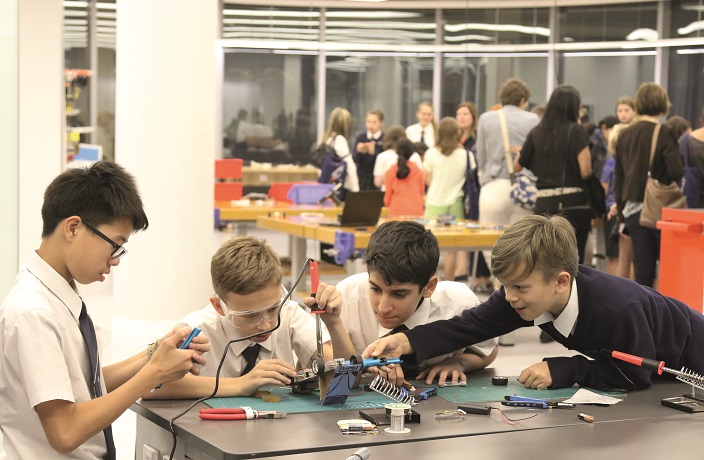As another school year draws to a close and children look forward to the summer holidays, it's time for teachers to reflect on the months that have passed and all they have achieved.
With this in mind, we asked Shanghai teachers to tell us a story about a standout moment from their year that left them inspired. Whether it was witnessing pure acts of kindness, embracing technology for higher efficiency, developing students into confident writers or taking a step back to see how far the class had matured, Shanghai teachers have spent the year learning themselves.
What a memorable way to finish off the year – a reminder that their dedication and passion has resulted in their students possessing a desire to excel, and that all who enter a classroom can learn and grow.
So, let's take a look at what left a lasting impression on the teachers of Shanghai this year. This week, we talk with Andrew Lancaster, who is Head of Secondary at The British International School.
 "I regularly say to my stuents at BISS Puxi, 'I am the oldest person in the room, not the smartest person in the room,'" said Paul Kelly, Deputy Head of Secondary, when we were discussing the changing nature of education over time.
"I regularly say to my stuents at BISS Puxi, 'I am the oldest person in the room, not the smartest person in the room,'" said Paul Kelly, Deputy Head of Secondary, when we were discussing the changing nature of education over time.
Together Paul and I have over 40 years of teaching experience, and during this time, we have witnessed an incredible learning evolution. It's moved from a teacher-led, almost one-directional approach, to a multi-directional method. Today, students collaborate with each other and explore the resources around them as much as they use their teachers to learn. At BISS Puxi, our approach to education is supporting our graduates to be independent learners with the confidence to know they can make a difference to the world they live in and a passion for wanting to do so.
Education has significantly evolved since the Victorian times when lines of children sat quietly behind desks doing precisely as their teacher asked. This system was designed to equip workers for the modern Victorian workplace in factories. In Victorian times, students were rewarded for following instructions. To be told, "Sit down, be quiet, do this," helped prepare a workforce for life on production lines.
Thinking about your job, are you rewarded for following instructions or are you expected to think for yourself? How much has this changed from your schooling? This type of learning, although still present in many schools around the world, is now considered as redundant as it is inauthentic.
We have moved from assessing students on their ability to recall facts and information given by their teachers to assessing their ability to process and synthesize information and understand how they can use this information across a range of subjects and topics.
The skills that students gain through collaborative learning reflect those that the modern workplace demands and indeed those that are predicted to be the essential skills required in 2025 and beyond. The top five skills identified by the World Economic Forum include complex problem-solving, critical thinking, creativity, people management and coordinating with others. When you enter the workforce, these are not natural skills. They need to be practiced, refined and developed in a nurturing environment where children can explore these areas safely.
At BISS Puxi, we are excited by the development of our STEAM curriculum and the opening of our two state-of-the-art facilities designed by EVA Architects – 'The Hamilton Centre' in our secondary school and 'The Da Vinci Centre' in our primary school. If you visit either of these wonderfully equipped spaces, you'll see we have placed design thinking at the center of learning activities. This approach gives our pupils the opportunity to build resilience and 'failforward,' as we do as adults. They learn to embrace the design-thinking loop, which entails the ability to research, empathize, define, ideate, prototype and test. Each element of the cycle repeats until their final product or submission is as good as it can be. Going through each of these stages offers students the chance to reflect on the process and have great pride in the outcome. This strategy demonstrates our 'Be Ambitious' philosophy; challenging students to think more and achieve more.

Andrew Lancaster is Head of Secondary at The British International School. The school's vision is to 'Be Ambitious' and for pupils to think more, achieve more and be more. Andrew's role involves transforming this vision into reality for learners and curriculum design forms an important part of this process. Technological changes and the inclusion of design-thinking in the learning approach at BISS will keep pupils up-to-date with the latest IT tools and ensure students develop skills of empathy, collaboration, problem-solving, implementation, evaluation and, of course, curiosity.
Paul Kelly has been a teacher at BISS Puxi since August 2011. He is Deputy Head of Secondary with a remit overseeing pastoral care. Paul project-managed the Hamilton Centre, BISS Puxi's new 'Design Thinking' space. Paul has a master's degree from Cambridge University and is passionate about developing students.


















